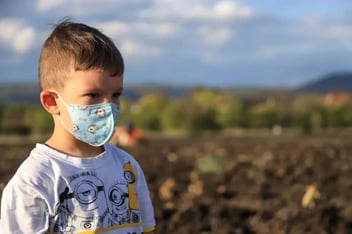Purer air makes children happier

A study shows the number of children needing psychiatric help increases when there is a spike in air pollution, establishing a clear link between polluted air and mental health of children
Do you have the gift seeing the light side of matters grave? Maybe, you are the one that may try to milk even a day when air pollution spikes for a chuckle or two. The sound effects that such a day can bring to office or home can be hilarious. They range from the apologetic to the explosive. A little sniffle here. A muffled grunt there. An echoing sneeze just next you that could squeeze you out of your skin. A harsh chortle from the other end as a sore throat tries to clear up. In spite of all this haliarity, the mood at home or in office is generally down. The guffaws that a joke sets off easily die away as sore throats and clogged noses struggle to sustain the excitement. The pervasive gloom is no coincidence, according to recent studies. Air pollution does have a connection with the mental wellbeing of people. It’s not limited to physical wellness.
When the sun is out and a breeze plays on the trees, our mood is bright and happy. Our mind joins the chirpy bird that flits about the treetops with a lilting hum. Contrast this with a day when the sky is downcast and smog cloaks the surroundings. One feels like kicking oneself for even the smallest errors. The mood in general has a negative edge to it. No wonder we come across so many grumpy faces on the way to work on an average day in Delhi or Bengaluru. We tend to look at matters in a more positive light on days when air pollution is down. In short, we are in a more positive frame of mind.
Is it all just in the mind, or is there something more to the feeling of wellness on a day when air pollution is down? Apparently, there is much happening to the body on a day when the level of air pollution shoots up. New research points to graver issues happening to the body because of air pollution than previously thought.
Moreover, children seem to suffer as much or more than the grownups from the effects of air pollution. Therefore, we need to learn to look at that child who looks moody and insolent on a smoggy day in a different way. Maybe s/he is in physical and mental distress. Of all forms of environmental pollution, air pollution is perhaps the worst and most damaging to health. When the air we breathe is itself polluted, no system in the body could remain unaffected.
Do you have the gift seeing the light side of matters grave? Maybe, you are the one that may try to milk even a day when air pollution spikes for a chuckle or two. The sound effects that such a day can bring to office or home can be hilarious. They range from the apologetic to the explosive. A little sniffle here. A muffled grunt there. An echoing sneeze just next you that could squeeze you out of your skin. A harsh chortle from the other end as a sore throat tries to clear up. In spite of all this hilarity, the mood at home or in office is generally down. The guffaws that a joke sets off easily die away as sore throats and clogged noses struggle to sustain the excitement. The pervasive gloom is no coincidence, according to recent studies. Air pollution does have a connection with the mental wellbeing of people. It’s not limited to physical wellness.with an increased incidence of anxiety and depression in children. Even short-term exposure to high ambient air pollution could cause a spurt in children’s visit to psychiatrists.
There have been studies showing the link between some psychiatric conditions in adults and air pollution. But this new study done over a five-year period suggests a definite link between children’s mental health and air pollution. The study says fine particulate matter known as PM 2.5, or microscopic particles smaller than 2.5 microns (micrometers) in diameter, could get deep inside the lung and pass into other organs by the bloodstream. They can cause irritation, inflammation, and respiratory problems. A longer-term exposure could be a contributory factor to cancer and heart diseases shows that higher levels of air pollution can affect children’s mental health. Their mental condition is particularly vulnerable to sustained higher levels of pollution. The study that CNN website has reported says high levels of pollutants in the atmosphere have a link with an increased incidence of anxiety and depression in children. Even short-term exposure to high ambient air pollution could cause a spurt in children’s visit to psychiatrists.
Researchers at the University of Cincinnati and the Cincinnati Children's Hospital Medical Center examined psychiatric patient visits, and then traced the concentration of PM2.5 back in their residential areas. They found that whenever there were increases in PM2.5, there would be more psychiatric visits within the following few days. The study also noted that visits on the same day as the pollution spike were mostly related to schizophrenia, while visits for adjustment disorder and suicidal thoughts came one or two days later. They also found that psychiatric effects of pollution increase – particularly disorders like anxiety and suicidal thoughts– affected children in disadvantaged areas, of lower socioeconomic class or less access to healthcare, more than those in other areas. “Collectively, these studies contribute to the growing body of evidence that exposure to air pollution during early life and childhood may contribute to depression, anxiety, and other mental health problems in adolescence,” said Patrick Ryan, a lead author. While he and Cole Brokamp, the other lead author, thought more research into this connection was needed but they believe the initial findings could offer new prevention strategies for children with those symptoms. The fact that children living in poverty experienced greater negative effects from air pollution also proved that the pollutant and neighborhood conditions combined to create “synergistic effects on psychiatric symptom severity and frequency.”
The long-term impact of air pollution on a population’s physcial wellbeing is well known. People with respiratoryconditions are especially vulnerable to the killer pollutants. Apart from discomforts like breathlessness, cough, sneezing, and itching in the eyes and the nose, the allergens can aggravate asthma and bronchial conditions, studies have long shown. A new study, however, should worry us even more considering how it could affect children and through them the generations of tomorrow. The study, published in the latest issue of the journal, ‘Environmental Health Perspectives’, shows that higher levels of air pollution can affect children’s mental health. Their mental condition is particularly vulnerable to sustained higher levels of pollution. The study that CNN website has reported says high levels of pollutants in the atmosphere have a link with an increased incidence of anxiety and depression in children. Even short-term exposure to high ambient air pollution could cause a spurt in children’s visit to psychiatrists.

.svg)
.webp?width=1080&height=1080&name=Free%20Case%20Study%20Steel%20Plant%20(1).webp)






Post Comments